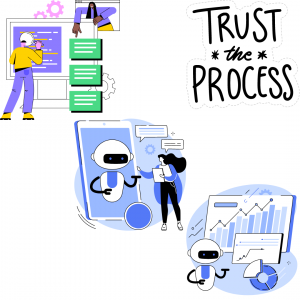The Journey from Spreadsheets to Custom Software

In today’s fast-paced business world spreadsheets are a thing of the past. Hello custom software! Companies are constantly searching for ways to enhance efficiency and optimize their operations. For many the journey from using spreadsheets to embracing custom software solutions marks a significant turning point. Custom software that not only addresses the limitations of traditional spreadsheets but also empowers businesses with tailored features that cater to their unique needs. In this blog post, we will explore this transformative journey from recognizing the constraints of spreadsheets to successfully implementing custom software solutions.
The Limitations of Spreadsheets
 Spreadsheets have long been an integral part of business operations due to their flexibility and user-friendly interface. However, as companies grow and operations become more complex, the inherent limitations of spreadsheets become more pronounced. A key issue with the use of spreadsheets is the difficulty in managing large volumes of data. As data sets expand rapidly spreadsheets become cumbersome and slow. Additionally, human error in data entry or formula creation can lead to significant inaccuracies which may affect decision-making processes. Another critical shortfall is the lack of real-time collaboration features making it challenging for multiple users to work simultaneously on the same data set without version control problems. Spreadsheets also lack advanced analytic capabilities limiting the depth of insights businesses can derive from their data. Finally, the security features in spreadsheets are often insufficient for safeguarding sensitive information posing risks for companies that handle confidential or proprietary data. These limitations drive businesses to seek scalable solutions like custom software.
Spreadsheets have long been an integral part of business operations due to their flexibility and user-friendly interface. However, as companies grow and operations become more complex, the inherent limitations of spreadsheets become more pronounced. A key issue with the use of spreadsheets is the difficulty in managing large volumes of data. As data sets expand rapidly spreadsheets become cumbersome and slow. Additionally, human error in data entry or formula creation can lead to significant inaccuracies which may affect decision-making processes. Another critical shortfall is the lack of real-time collaboration features making it challenging for multiple users to work simultaneously on the same data set without version control problems. Spreadsheets also lack advanced analytic capabilities limiting the depth of insights businesses can derive from their data. Finally, the security features in spreadsheets are often insufficient for safeguarding sensitive information posing risks for companies that handle confidential or proprietary data. These limitations drive businesses to seek scalable solutions like custom software.
Need for Custom Software
Acknowledging the limitations of spreadsheets frequently leads businesses to scrutinize their data management needs more thoroughly. Custom software offers a compelling alternative designed to address specific operational challenges that generic tools can’t manage. The initial phase in reaching a decision involves pinpointing the inefficiencies and limitations currently hindering productivity. By addressing these pain points custom software enables businesses to enhance their operational efficiency and achieve more accurate, data-driven decision-making.
The Benefits of Custom Software
Custom software offers numerous benefits that make it a worthwhile investment for businesses looking to enhance their operations. One of the most significant advantages is customization software can be tailored to meet the unique needs of a business incorporating specific features and functionalities that spreadsheets cannot offer. Custom software also provides scalability allowing businesses to adapt and grow without the constraints of traditional tools. Enhanced security measures ensure that sensitive data is protected by reducing the risk of breaches. Custom software often includes advanced analytics and reporting tools enabling more informed decision-making. These benefits collectively enhance operational efficiency, improve data accuracy, and support strategic growth.
The Development Process of Custom Software
 Developing custom software involves a series of crucial steps each designed to ensure the final product effectively meets business needs.
Developing custom software involves a series of crucial steps each designed to ensure the final product effectively meets business needs.
- Consultation: The process kicks off with a comprehensive analysis where consultation happens to gather detailed requirements. This phase is essential for understanding the specific challenges and objectives the software aims to address.
- Design phase: Translates requirements into a concrete plan outlining the software’s architecture, user interface, and core functionalities.
- Development: The actual development work begins. This stage is dynamic involving constant coding, testing, and refining to ensure the software performs as intended. Quality assurance plays a significant role here with rigorous testing to identify and resolve any issues that could hinder functionality. User feedback during this period is invaluable as it helps developers fine-tune the software to better align with end-user expectations.
- Final Testing: Once development is complete the software undergoes a final round of testing before deployment. This ensures that all components are functioning harmoniously and that the system is sound.
- Deployment: This is when the software is being used by the end user. Ongoing support and updates are crucial to address any emerging issues and to adapt the software to evolving business needs. Regular maintenance ensures the software remains effective and continues to deliver value over time.
Key Considerations When Transitioning from Spreadsheets to Custom Software
Transitioning from spreadsheets to custom software requires careful planning and consideration. Businesses must evaluate development costs and ensure they have sufficient resources allocated for the project. Another key aspect to consider is security. Custom software must incorporate strong safeguards to ensure the protection of sensitive business information. Scalability should be another key component for the software to grow and adapt with the business. Finally, keep in mind the potential need for ongoing maintenance and updates. Allocating resources for regular software maintenance will ensure it remains effective and continues to meet evolving business needs. Budgeting for most businesses is a primary concern. Choosing a reputable software development partner is vital. That is why at Nexix, with our expertise and understanding of your unique business needs we can help you develop an exceptional product.
Future Trends in Business Data Management
 As technology advances several emerging trends are set to redefine business data management. Artificial intelligence (AI) and machine learning (ML) are at the forefront offering capabilities such as predictive analytics and process automation. These technologies enable businesses to analyze vast amounts of data quickly and accurately uncovering insights that were previously inaccessible. Cloud-based solutions are also transforming data management providing scalable, flexible, and cost-effective options for storing and processing data. The accessibility of cloud platforms ensures that businesses can manage their data from anywhere. Another trend is the emphasis on data privacy and security. With increasing regulatory requirements and growing concerns about data breaches businesses are adopting more sophisticated encryption methods and access controls to protect sensitive information. Staying abreast of these trends will enable businesses to remain competitive in an ever-evolving digital landscape.
As technology advances several emerging trends are set to redefine business data management. Artificial intelligence (AI) and machine learning (ML) are at the forefront offering capabilities such as predictive analytics and process automation. These technologies enable businesses to analyze vast amounts of data quickly and accurately uncovering insights that were previously inaccessible. Cloud-based solutions are also transforming data management providing scalable, flexible, and cost-effective options for storing and processing data. The accessibility of cloud platforms ensures that businesses can manage their data from anywhere. Another trend is the emphasis on data privacy and security. With increasing regulatory requirements and growing concerns about data breaches businesses are adopting more sophisticated encryption methods and access controls to protect sensitive information. Staying abreast of these trends will enable businesses to remain competitive in an ever-evolving digital landscape.
Conclusion: Embracing the Future with Custom Software
Transitioning from spreadsheets to custom software signifies a pivotal advancement in how businesses manage and utilize data. By addressing the limitations of traditional spreadsheets. custom software can enhance operational efficiency, improve data accuracy, and support strategic growth through advanced analytics and real-time collaboration features. The integration of emerging technologies such as artificial intelligence and machine learning further elevates the capabilities of custom software, enabling predictive insights and process automation that were previously unattainable. By developing custom software businesses not only streamline their current operations but also future-proof themselves against the ever-changing digital landscape and maintain a competitive edge in their industries. Contact Nexix today and let us assist you with cutting-edge custom software solutions while envisioning a future of innovation.
